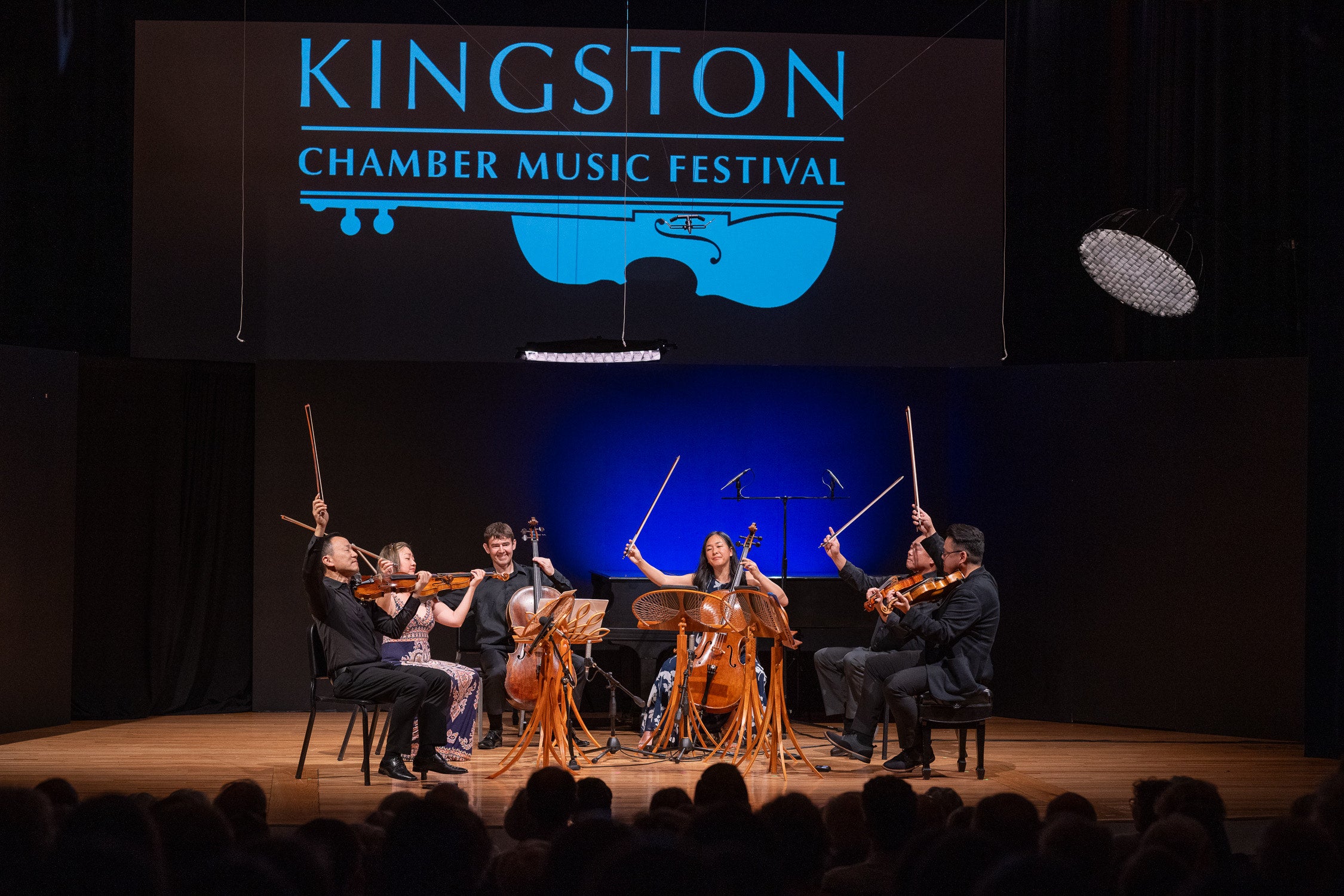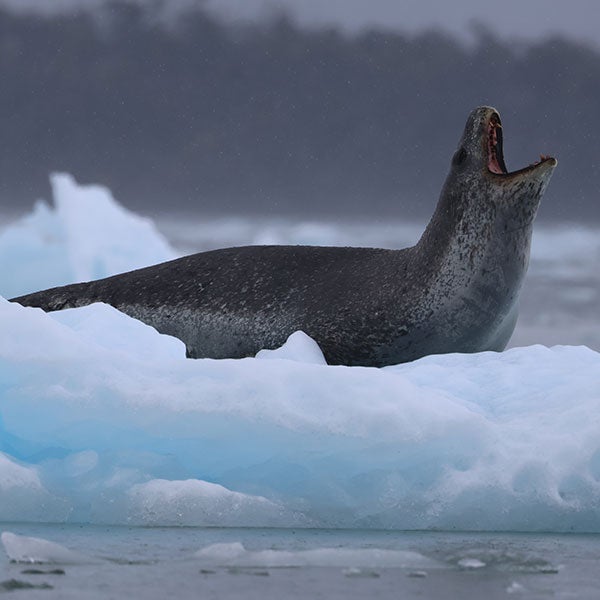Animal Behavior Research
Understanding how animals behave and what influences their behavior are crucial components of conservation efforts.
This spring, Brandon Ferro and Lilly Brooks, animal science and technology (AVS) majors, learned modern animal training techniques as part of a course on animal behavioral research with Assistant Professor Justin Richard at URI’s Peckham Farm. Richard spent nine years as a beluga whale trainer at Mystic Aquarium prior to pursuing research in animal behavior. He brings this professional experience to his URI courses in animal behavior and zoo and aquarium animal care and management.
While the techniques Ferro and Brooks learned apply to many different species, this semester they worked with chickens. To establish a good rapport with their chickens, the students began with desensitization and classical conditioning to get the chickens used to being around unfamiliar stimuli—both the humans and the rewards. “Desensitization meant getting the chicken used to me in an environment away from her normal habitat,” Ferro says.
“We are using crushed up mealworms as our reinforcement,” Brooks adds, “but when we started they had never eaten mealworms before. We first had to desensitize them and get them used to eating the mealworms.” Classical conditioning techniques were then used to train the chickens to eat mealworms out of a cup or to peck at them on the table.
Once the chickens were comfortable, the students were able to begin using operant conditioning in their training sessions. Operant training uses a consequence (such as a reward) to modify the behavior that precedes it. “Whenever my chicken performs a behavior that I want her to do, I reward her for it,” says Ferro, “and I can then influence her to develop that behavior by continuing to reinforce her.”
Positivity matters
The students only use positive reinforcement—giving the chicken something it wants (mealworms) to increase the frequency and occurrence of the behavior. When an animal exhibits an unwanted behavior, the trainers employ Least Reinforcing Stimuli, a short pause in the training session so the animal is not reinforced for the behavior.
“This emphasis on the positive is widely used in professional animal training, from dogs to zoo animals,” says Richard. “Students have leveraged this course experience in internship and job interviews, with former students working as professional dog trainers and animal care professionals at zoos and aquariums across the country, working with a wide variety of species from dolphins to penguins to sea lions to reptiles.”
When it comes to chickens, simple is better. “You have to be very literal when working with chickens—they won’t interpret anything,” Ferro says. “They just want food and will do the easiest thing possible in order to get it. This led to some challenges as I had to be very specific with the way I wanted to shape her behaviors and how and when to reinforce.”
Timing also needs to be very specific when it comes to correctly employing positive reinforcement, Brooks notes. “Over the semester I have gotten the hang of when to reinforce my chicken so that the frequency of the correct behavior increases,” she says. “We use a clicker as our ‘bridge,’ a neutral stimulus/object that is paired with the food to tell the chickens the exact moment they did something correct. They are often used in dog training, too.”
“Something that has been challenging but rewarding is breaking down the behaviors into smaller approximations or steps and working towards the end behavior goal,” Brooks adds. “Some behaviors are more challenging to break into smaller steps, but it’s easier for the chicken to understand if we do something little by little instead of jumping to the final behavior.”
This is the mark of a good animal trainer, Richard notes. “Good animal trainers are patient, have excellent attention to detail, and always look to set the animals up for success, all traits that Brandon and Lilly have shown this semester.”
“If we train animals, we have a much easier time doing daily health checks or giving voluntary medications, and in managed care we can have much calmer animals that are not aggressive with us.”
—Brandon Ferro, Animal science and technology (AVS) major
The importance of animal training
Ultimately, the techniques that students are using are important for animal caretaking—and for larger conservation efforts. “Training is extremely helpful in day to day animal husbandry and research with animals under managed care,” says Ferro. “If we train animals, we have a much easier time doing daily health checks or giving voluntary medications, and in managed care we can have much calmer animals that are not aggressive with us since we have associated us (the trainers) with reinforcing stimuli, like food. Animals under managed care also offer lots of opportunity for research, using animals that will give us voluntary health data we can use in populations in their natural habitat to further aid in conservation.”
Ferro also worked as a husbandry volunteer with the penguin department at Mystic Aquarium this semester and plans to complete an internship at Brookfield Zoo in Chicago this summer. Recent graduate Brooks hopes to become a zookeeper, having already completed internships at two different zoos during her academic career at URI.
“Unique experiential learning opportunities at URI position AVS students to be successful in this competitive and rewarding career path,” Richard says.
—An earlier version of this story appeared on the College of the Environment and Life Sciences website
Latest All News
- URI economist: Rhode Island economy contracts in May, state on precipice of recessionWHAT: While state economic data for April showed a temporary reprieve, the Current Conditions Index slipped back into contraction territory in May with a value of 42. According to University of Rhode Island economist Leonard Lardaro, the CCI has remained in a neutral or contraction value every month since December and continue to lag their […]
- Rhode Island legislators approve crucial appropriation for unique weather-related tools at URIKINGSTON, R.I. – July 21, 2025 – Rhode Island legislators have endorsed a powerful complement of tools developed and housed at the University of Rhode Island so they can continue to benefit the state coastline and residents, approving $200,000 in the 2026 fiscal year budget. Legislators and researchers say that support to keep URI’s critical […]
- Kingston Chamber Music Festival to feature URI alumni duo among world-class lineupKINGSTON, R.I. – July 17, 2025 – University of Rhode Island alumni Adrián Montero Moya and Moé Takamatsu will share the stage with internationally renowned musicians when the Kingston Chamber Music Festival returns to the University from July 23 to Aug. 3 – a thrill for any musician, let alone someone only a few years […]
- Two URI nursing professors to be inducted as Fellows in American Academy of NursingKINGSTON, R.I. — July 16, 2025 — Two University of Rhode Island College of Nursing professors have been selected to receive the highest recognition of accomplishment in the nursing profession, induction as Fellows in the American Academy of Nursing. Associate Professor Amy D’Agata and Assistant Professor Erica Liebermann are just the latest URI faculty members […]
- The elusive leopard sealURI’s Sarah Kienle is contributing to the scientific knowledge base of an understudied top marine predator, the mysterious leopard seal, a solitary creature that spends most of his life underwater. (Photo: Renato Borras-Chavez)
- Coventry’s Andrea Yates honored with URI Part-Time Teaching Excellence AwardKINGSTON, R.I. – July 14, 2025 – The Office of the Provost at the University of Rhode Island recently honored Andrea Yates, a Coventry resident, who teaches in the Department of English and the Department of Film/Media, with the Eighth Annual Part-Time Faculty Teaching Excellence Award. Professor Yates was presented the award, which includes a […]













